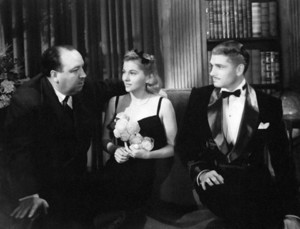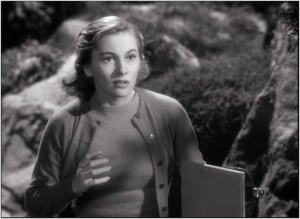We have the custom of watching one movie a month in the monastery. I pick out the movie, which is to say, we watch a lot of Alfred Hitchcock.
Last night, it was Rebecca. It features a twist on the “wrong man” motif that drives many of Hitch’s most suspenseful films. In this case, it’s the vulnerable blonde beauty, Mrs. de Winter, who is the “wrong man,” thrown into a situation that is beyond her own experience, strange, and threatening. Hitchcock is frequently criticized for his allegedly patronizing handling of female characters. On a superficial level, one can see Joan Fontaine’s Mrs. de Winter in this light. What’s unusual in this film, which is based on a novel by Daphne du Maurier–and thus is told from the female perspective–is that Mrs. de Winter turns out to be quite resourceful. Her resolve to stay with her husband (Laurence Olivier) turns out to be one of the pivots of the plot, and this resolve emerges once she separates herself out from the influence of the housemaid Mrs. Danvers. Early in the film, in her insecurity over having married upward into the aristocratic world, she trusts Mrs. Danvers. Danvers represents expert knowledge of the bewildering world of de Winters’s Manderley estate. Once the heroine recognizes the malice in Danvers, she begins to rely on her own inner compass, helps her husband to add new behaviors to his repertoire of responses, and helps to clear him against the wrongful accusation of murdering his previous wife. The final scene, which I won’t spoil for those who might wish to see the film, is perhaps a symbol of Maxim de Winter’s newfound freedom afforded by the unexpected emergence of resolve in his new wife.
This got me thinking of this trope in Hitchcock’s work. Biographers will tell us that Hitch always felt a bit like a pretender. As the son of an English Catholic greengrocer, he grew up on the outside of higher class society looking in. His “wrong man” characters (Cary Grant in North by Northwest, Jimmy Stewart in Vertigo and The Man Who Knew Too Much, and Robert Donat in The 39 Steps, though I could go on) all awaken suddenly to find themselves aliens, lacking critical information to make sense of a dangerous situation. All of them grow into their parts by acting decisively and determinedly. None of them have the luxury of gaining expertise, or, in the case of Mrs. de Winter, trusting in someone else’s expertise.
There is nothing wrong with expertise, but an over-reliance on it creates the opposite of what we see in Hitchcock’s characters: irresolution and paralysis. We become afraid to tackle any problem before reading five books and consulting the internet for further references. We become passive, waiting for the experts to weigh in, losing any sense of adventure.
I would like to suggest that this anxious paralysis is related to the meritocratic state we’ve been trying to create in the U.S. over the past hundred years or so. The older, frontier mentality was based on risk-taking and an entrepreneurial desire to exit the sclerosis of the Old World. While late 19th-century Progressivism had many virtues, the general drift of this tendency in American history has been away from the frontier pluckiness and toward a greater reliance on sedentary expertise and bureaucracy. This shift has made us more anxious and less creative in dealing with the inevitable threats that come with life. It makes sense that Hitchcock would have moved away from England to America; his favorite character type is more at home in the States. Is this character type still recognizable in American culture today?

